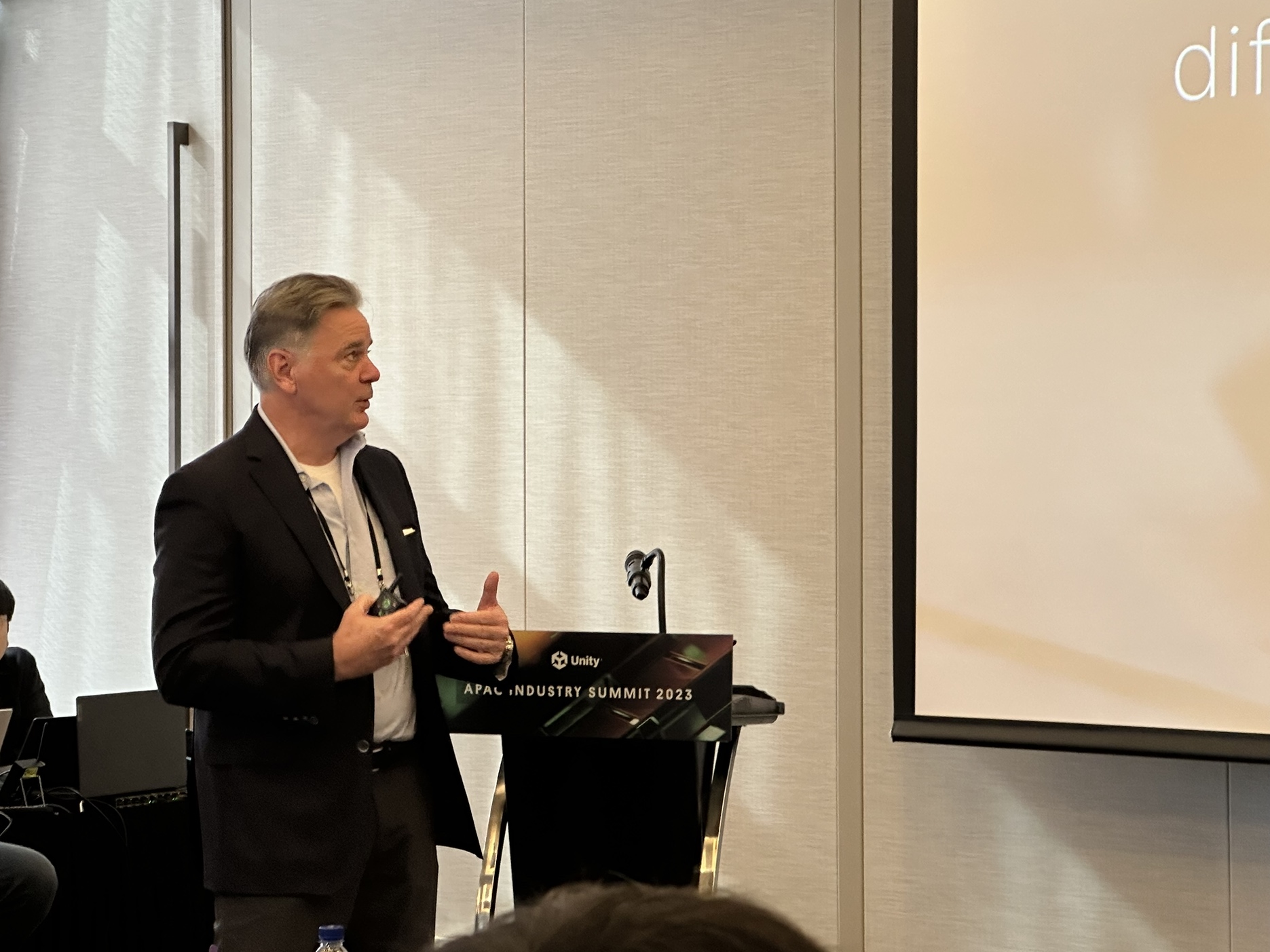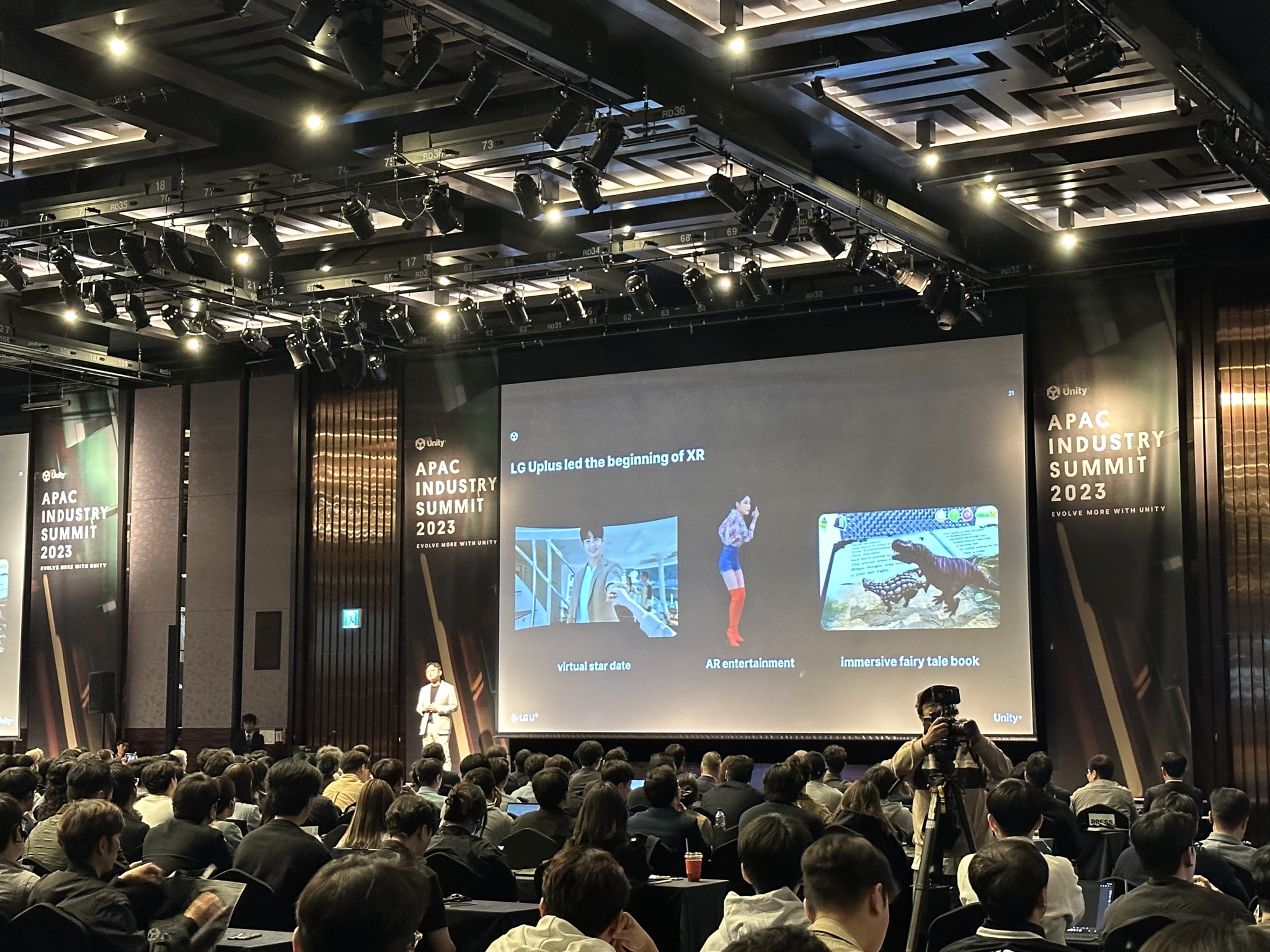유니티가 게임 엔진 핵심 기술을 활용해 디지털 트윈 구축을 위한 시장 공략을 본격화한다.
유니티는 5일 삼성동에서 최초 아태지역 통합 '유니티 APAC 인더스트리 서밋 2023'을 개최해 산업 분야별 전문가, 크리에이터, 업계 관계자 대상으로 유니티 핵심 기술 활용사례와 최신 트렌드를 공유했다. 행사 기조연설에는 유니티 로리 아메스 유니티 솔루션 디벨롭먼트 부문 부사장을 시작으로 LG유플러스, 현대자동차 등이 연사로 참여했다.

▲유니티 로리 아메스 유니티 솔루션 디벨롭먼트 부문 부사장
로리 아메스 부사장은 "산업 현장에서 혁신적인 행보를 보이고 있는 한국의 실시간 시뮬레이션과 디지털 트윈 활용 사례가 증가하고 있다"며, "게임 엔진 회사 유니티는 실시간 3D 기술을 활용해 산재된 데이터를 기반으로 새로운 내러티브를 만들어 디지털 트윈을 구현할 것"이라고 말했다.
디지털 트윈은 '공정의 가상화'다. 현실과 가상현실의 실시간 연동을 가능케 하는 디지털 트윈 기술은 다양한 산업에서 구축될 수 있다. 디지털 트윈 시장은 2023년까지 연간 약 25%의 성장률을 기록해오고 있으며, 900억불 규모로 성장하고 있다.
이런 추세에 따라 유니티의 플랫폼은 자동차, 스마트시티, 항공우주, 의료 등 다양한 산업에서 디지털 트윈 구축에 활용되고 있다. 유니티는 현대자동차, LG유플러스, 삼성중공업, CJ 라이브, 현대인프라코어 등 유수의 기업을 고객으로 두고 있다.
유니티는 디지털 트윈을 실시간 3D 형태로 제공하는 점을 강조했다. 로리 아메스 부사장은 "실시간 3D를 적용해 IoT 기기에서 제조 데이터를 수집 및 시각화하고, 통합 파이프라인 모델을 구축함으로써 프로세스를 '라이브화'하는 것을 디지털 트윈의 핵심"이라고 말했다.
현재 게임 산업은 초당 30프레임 이상을 지원하고 있는 반면 산업 분야에서 캐드(CAD)의 속도는 초당 5-6프레임에 불과하다. 여기에 기존 2D로 제공하던 것을 실시간 3D로 제공해 오차를 최소화하여 공정을 최적화 한다. 또한 유니티는 스마트폰, 아이패드 등 모든 디바이스에서 데이터의 수집을 지원할 수 있게 해준다.
이날 유니티는 유니티의 XR 기술 기반 성과 사례를 소개하기도 했다. 애플 비전 프로가 공식 출시를 앞두고 있는 가운데, '유니티 폴리스페이셜(Unity PolySpatial)'은 개발자들에게 비전 프로 애플리케이션 개발을 가능케 한다. 즉 유니티 에디터(Unity Editor)와의 통합으로 크리에이터들은 비전OS에서 실행되는 경험을 제작하고 애플 비전 프로의 기능을 활용할 수 있다.
유니티는 "애플 비전 프로는 아직 출시되지 않았지만 현재 유니티를 통해 애플 비전 프로용 앱을 개발할 수 있는 단계로, 2D형부터 몰입형까지 가능하다"고 말했다. 현재 몰입형 앱은 유니티 웹사이트의 플러그인으로 개발이 가능하다.
유니티는 XR 기술에 오랜 기간 투자를 이어오고 있으며 가장 빠르게 새로운 디바이스의 XR 콘텐츠 개발을 지원해오고 있다. 유니티는 "사용의 복잡성과 개발의 파편화를 극복하기 위해 다양한 플랫폼을 지원하기 위한 API를 다양하게 준비해놓고 있으며, 한번의 프로젝트를 통해 모든 디바이스에 퍼블리싱 가능한 기술을 개발하고 있다"고 전했다.
유니티는 AI 기술이 디지털 트윈에 미치는 영향과 중요성도 강조했다. 유니티는 유니티 센티스(Unity Sentis), 유니티 뮤즈(Unity Muse), AI 마켓플레이스(AI Marketplace) 등 자체적 AI 서비스를 출시한 바 있다.
'유니티 센티스'는 높은 클라우드 컴퓨팅 비용이나 지연에 대한 걱정 없이 역동적인 인터랙티브 경험을 구상하고 구현할 수 있도록 돕는다. 크리에이터는 클라우드 컴퓨팅 비용이나 지연에 대한 걱정 없이 모든 플랫폼에서 실시간 3D 경험을 제공할 수 있게 됐다. 특히 유니티의 센티스 런타임은 스마트 NPC부터 공장 생산 현장 재현에 이르기까지 인터랙티브 게임 플레이와 디지털 트윈의 가능성을 극대화한다.
유니티는 "AI의 적용은 모든 산업계에서 자연스럽게 이뤄지고 있으며, AI는 어셋 준비와 현실공간의 사물 인식, 데이터 훈련 및 예측과 공장 내에서도 사용된다"고 말했다.
이날 행사에 참여한 LG유플러스 김민구 랩장은 유니티와의 기술 파트너십을 기반으로 공간을 디지털화함으로써 공간 확장 서비스를 구현한 사례를 소개했다.
LG유플러스 김민구 랩장은 "5G 상용화 이후 3D 콘텐츠를 스트리밍으로 제공할 수 있는 인프라 환경이 조성돼 이에 따라 다양한 비즈니스의 기회도 창출됐다"며, "LG유플러스는 유니티와 기술 협력으로 볼륨 매트릭 콘텐츠 제작 기술과 융합을 통한 서비스를 제공했다"고 말했다.
공간의 디지털화는 메타버스로 진화하고 있다. LG유플러스는 "가상 세계에서의 상호작용 뿐만 아니라 가상 및 현실 간의 상호작용을 확장해 고객의 일상생활에서 연결성이 극대된 라이프 스타일 플랫폼을 만들겠다"고 말했다.
또한 현대자동차는 유니티와 작년 CES 2022에서 '미래 메타버스 플랫폼 구축 및 로드맵 마련을 위한 전략적 파트너십'을 체결한 바 있다. 양사는 실시간 3D 메타버스 플랫폼에 현실의 스마트팩토리를 그대로 구현한 디지털 가상공장 '메타팩토리(Meta-Factory)'를 구축하기로 협의했다.
현대자동차는 유니티의 솔루션으로 최적의 생산 운영 정보를 가상에서 실시간으로 평가하고 도출한다. 이날 현대자동차그룹 싱가포르 글로벌 혁신센터 정홍범 대표는 "향후 여러 차종의 생산 시나리오에서 시뮬레이션을 통해 이동식 로봇의 이동 경로와 조립용 로봇을 실시간 제어할 수 있을 것"으로 기대했다.

